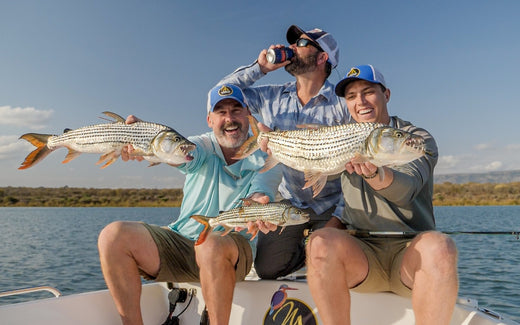Another year another Pongola
The Mavungana Fly Fishing's 2024 Pongola seasons have now come to an end. Like every year preceding '24, Lake Jozini was once again an ever changing system, a Rubik’s cube of fly fishing you could say. However, unlike a Rubik's cube which can eventually be patterned, the mighty tigerfish which inhabit these waters, and the system itself, constantly altered the plans and theories.
With 28 cumulative years of guiding on this expansive body of water, the Mavungana Flyifishing team was ready to hit it head on and produce an experience for our clients which is unrivaled. The autumn season (May & June) greeted us with clarity which would rival all previous years and turned out to be a season to remember. Although proving difficult in terms of the fish numbers we were used to for this time of year, it completely shattered the norm with respect to big fish. Towards the end of the season the guides were gunning to be the first to hit the mythical double digits (DD) mark on the head, as all the big fish that season eclipsed it. Our client record was broken twice, in one day, with a 14 and 14.5 pounder. All the other DD plus fish ranged from 11 to 13 lb.


Although a biblical season with big fish, times got tough. Some sessions all four boats came back with not much to show. It was a constant dance dealing with multiple factors which were alway swinging and dictating results. Time spent on the water, however, paid off. Although each week ended off with between 40-70+ fish, it required work. Work does take on a different meaning however when one is drifting down the margin edge, chucking flies while watching a herd of elephants frollicking 30 m away in the water.
The highlight of the autumn is the topwater fishing. Although not necessarily the best method for boated results, the eat from a good tiger on a glassed off surface is as akin to a big brown trout eating a dry fly as it is to a GT charging down a popper. Like the dam and fish, it was ever changing. We scaled up the gear, and still lost battles, followed by scaling down to get the bite and still coming short. When the end of our season came round in late June, the only constant throughout all the years was us guides being sad at the fact that we were leaving.

Along came August, marking the start of the spring season. Two months of putting the puzzle together lay ahead of us. When launching the boats on our day of arrival we stood in absolute astonishment at the water edge. The dam had dropped ever so slightly and the water was the clearest we have ever seen. Before even wetting a line we knew there were going to be more challenges to conquer. It didn’t take us long into our setup and recce fishing phase to realise it was on but needed adapting on our behalf, with the first 10 pounder coming out on our first full day.
As our groups started coming through it felt like each week was an escalation on the last. It may have just been coincidence or maybe it was our constant debriefs when each guide’s puzzle pieces fell into place. Numbers of fish were once again at the levels we expected and unfortunately the war stories of big fish lost outnumbered the victories. All of this would take place in an environment you can't replicate in South Africa, where you are fishing away while watching African wildlife against the water edge.

What a lot of people who have not experienced this fishery with us don’t grasp is how technical and dynamic it is. You are fishing for the quintessential African freshwater game fish in an environment which is never the same yet always stacked in the fish’s favour. It has been written about since fishing for tigerfish was recorded on pen and paper, these fish hit hard and tackle failure typically occurs in a few seconds. Like topwater fishing in the Autumn season, sight fishing is the highlight of the Spring. Sneaking into certain areas with our specialised boats (one could argue approach), in the right conditions and seeing tigers free swimming in every direction gets guides and clients excited. The true test of character comes when one should be passing fish by and rather wait for a fish of subsistence to appear. Again, it may not be the best strategy for turning over the sheep clicker, but we are yet to meet a client who doesn’t stop excitedly talking about all the shots they had as if he had just landed the lake record.
Every day water levels dropped and by the end it was significantly lower, trees we fished down below were now a hazard when running the boats. Lake Jozini, the popular venue it is, also increased in tempo with traffic as the season progressed, yet the job got done. Although we didn’t break previous records we came within earshot multiple times. Come late September and the dreaded end was in sight. Gear was broken down and boats were cleaned and stored, yet in our minds we still were plotting strategies according to the wind, sun and moon. Mavungana’s tiger fishing may be done for the year and although it was a year of note, we expect it to radically change next year. The picture we pieced together over the seasons is still not complete and may it forever remain that way."

